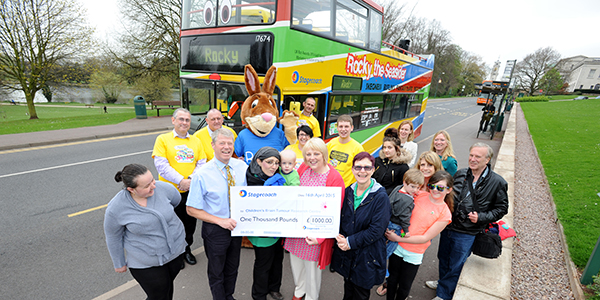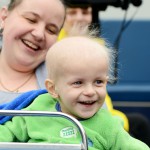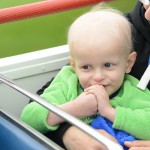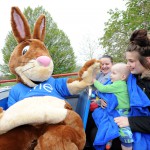
April 20, 2015, by Emma Thorne
On the buses with youngsters at Nottingham brain tumour centre
Rocky, the open top bus, took a break from touring the seaside to put in an appearance on campus recently to mark a new donation to an appeal to raise £1.8 million for a vital new piece of medical and research equipment.
Children from the University’s Children’s Brain Tumour Research Centre (CBTRC), their families and healthcare professionals, were given the opportunity to take a spin around the Queen’s Medical Centre and University Park campuses in the brightly coloured bus, part of Stagecoach’s Skegness Seasiders fleet of open top buses. Each bus is a character based on a classic holiday theme — Rocky, Sandy, Pierre, Shelly, Salty and Candy. Ralphie the mascot joined them and there was music, and packs of storybooks and goody bags were handed out.
Stagecoach laid on the bus after handing over £1,000 as part of on-going fundraising efforts for the CBTRC. Louise Wright, publicity officer for Stagecoach East Midlands, has a personal connection with the CBTRC and has raised more than £20,000 so far.
Her daughter, Leah Brockbank, battled with a brain tumour for three years and was treated at the centre. Leah passed away on January 1 2013 and now Louise continues to raise money for the charity, with support from family, friends and Stagecoach colleagues and customers.
Louise said: “CBTRC is a charity close to my heart as a result of the amazing work they carried out to help Leah have a better quality of life so I’m delighted to present them with this cheque. This donation now makes the total £21,573. The children seemed to really enjoy going out with Rocky and meeting one of our mascots — Ralphie.
“The research centre does an incredible job for so many young people and Stagecoach are pleased to be able to help support their work.”
Leah’s treatment was headed by Professor Richard Grundy, Director of the Co-CBTRC.
Professor Richard Grundy, Co-Director of the CBTRC and Professor of Paediatric Neuro-Oncology and Cancer Biology, said: “We’re incredibly grateful to Stagecoach and their customers for this wonderful contribution. Funding research into childhood brain tumours is the key to improving diagnosis and treatments and ultimately increasing survival of these difficult to treat tumours whilst also reducing disability rates.”
The latest fund-raising efforts came from sales of a Skegness Seasiders story book. The money will help CBTRC to fund the UK’s first truly intraoperative in-theatre MRI scanner. This will allow Nottingham surgeons to take detailed scans of a patient’s brain whilst on the operating table. The scanner will also be used for research into improving outcomes for people suffering with rare forms of brain tumours.
The system will allow the surgeon to visualise more easily the extent and position of the tumour to ensure that all, or as much as possible, of the tumour is safely removed during the operation.
Added to the money already raised by Nottingham University, Nottingham Hospitals Charity will be fundraising for the final amount to purchase this vital piece of life-saving equipment.
Jenny Wing, Head of Fundraising for Nottingham Hospitals Charity said: “We would like to thank Stagecoach for their generous contribution towards this appeal. Our collaboration with the University of Nottingham means we are so close to bringing this potentially life-saving piece of equipment to Nottingham and indeed the UK.
“The iMRI will transform the way care is delivered to patients with brain tumours giving them the best chance of recovery. We need to raise a final £650,000 to purchase this scanner and thanks to Stagecoach, we are one step closer to truly enhancing care and treatment for our patients.”
Donald Macarthur, Consultant Neurosurgeon at Nottingham University Hospitals NHS Trust and Honorary Clinical Associate Professor at The University of Nottingham, said: “For the first time this equipment will enable us to carry out detailed MRI scans, without moving the patient, during an operation to remove a brain tumour making that surgery as effective and safe as possible.”
- Patient Jacob Mather (2) enjoying the bus ride
- Patient Jacob Mather (2) enjoying the bus ride
- Stagecoach mascot Ralfie, gets a high five from patient Jacob Mather (2) who was enjoying the bus ride with his mum Rebecca (left) and his sister Kayleigh (17)
- Patient Jacob Mather (2) enjoying the bus ride with Jane Roberts – Health Play Specialist
No comments yet, fill out a comment to be the first





Leave a Reply